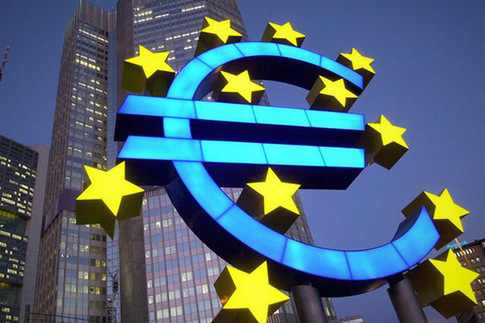ECB plays fiscal waiting game
- By Lou Chunhao
 0 Comment(s)
0 Comment(s) Print
Print E-mail
China.org.cn, December 18, 2011
E-mail
China.org.cn, December 18, 2011
The European Central Bank (ECB) seems to adopt a different stance to other central banks, which adopt quantitative easing whenever the market requires it. By contrast, the ECB, despite facing strong market demands for more liquidity, stands firm, seemingly holding a banner which reads: "Following the treaty of prohibiting monetary financing." Whether true or not, this was very much the impression given to journalists at a press conference held on Dec. 8 by the ECB's new president Mario Draghi.
|
|
|
The ECB was founded in the 1990s and was established under the principle of independence and its main function is to maintain price stability within the eurozone. [File Photo] |
The question is: Will the ECB return to role played by its counterparts, such as the Fed? Maybe, but not yet.
The ECB was founded in the 1990s and was established under the principle of independence and its main function is to maintain price stability within the eurozone. Article 123 of the Treaty on the Functioning of the European Union does indeed prohibit the ECB from financing EU member countries. Such financing is considered a way of transferring funds from competitive countries such as Germany and the Netherlands to those with high-debt-to-GDP ratios in south Europe. This is obviously the reason why Germany and other north European countries are not in favor of buying too many public bonds from southern European countries. The resignation of the ECB's chief economist Jurgen Stark resignation is seen by some as a sign of Germany's strong opposition to the ECB's bond-buying program which takes in such "toxic" bonds.
Therefore, the ECB's conscious "detachment" is a product of pressure. However, when even Angela Merkel has to compromise against the backdrop of the ever-deepening crisis, the ECB will not stay detached for long. In fact, we have already seen some signs which point to the truth of this. For instance, the ECB has reduced its interest rate from 1.25% to 1%, and also reduced the rating threshold for certain asset-backed securities (ABS) in order to widen collateral availability. These are obvious credit enhancement measures for those European banks that are facing rising costs.
Despite Mr. Draghi's insistence at the press conference that there would be no circumvention of the treaty that prohibits the central bank from financing member governments, he, or the ECB will have to circumvent, or even redesign, the treaty when the time comes. So under what circumstances would the ECB have to act in the same manner as its counterparts in the US and UK?
At the press conference, Mr. Draghi denied the possibility of channeling money through the IMF to those debt-ridden countries. The EU Summit last week agreed that the ECB would take responsibility for the European Financial Stability Facility (EFSF) and European Stability Mechanism (ESM), putting the bank in charge of the eurozone's bailout funds. According to the agreement, the ESM will channel 200 billion euros to the IMF in order to guarantee that the IMF has enough firepower to save those high debt ratio countries. In addition, the agreement also gives the ESM the option of restructuring European banks if such an emergency measure is deemed necessary by the EU commission and the ECB.
Since the ECB's main objective is to maintain price stability, when markets signals a possibility of deflation, it will take necessary measures when the market signals the possibility of deflation. Such measures would include further expanding the scale of the toxic bond-buying program which currently has a ceiling of 20 billion euros per week. But if market deteriorates further, which is quite possible, the ECB will have to act as the "buyer of last resort" for eurozone sovereign bonds, which has actually been promoted by France. Based on Europe's sluggish growth prospects for 2012, the ECB projected an inflation rate of lower than 2% in 2012, with countries like Greece and Italy introducing budget cuts and banks raising core tier capital ratio to 9%, thus reducing liquidity to the real economy.
Of course, the ECB will not play it cool when the euro reaches the verge of collapse. There is a Chinese saying: "If the skin has fallout, where should the hairs stay?" It is now reported in the Wall Street Journal that some national central banks in Europe have begun drawing up plans in case member states withdraw from the euro or the currency collapses. This possibility, although slight, cannot be ignored.
Taking all this into account, now is not the time for the ECB to break its cool, even rigid stance, and go beyond the treaty. As one of the participants at the recent European summit said: "We are still waiting for the destination to come to our face. Only then will you see decisive and effective results." For now, Mr. Draghi must wait, and he is waiting for the right moment.
The author is a researcher with the Institute of South and Southeast Asian and Oceanian Studies, China Institutes for Contemporary International Relations. His research interests include global economy.
Opinion articles reflect the views of their authors, not necessarily those of China.org.cn.






